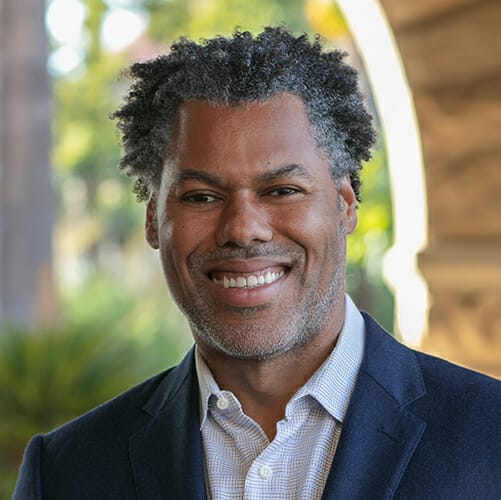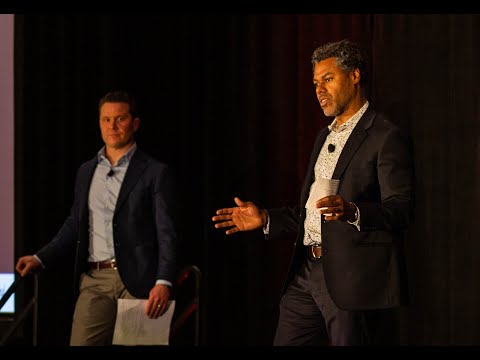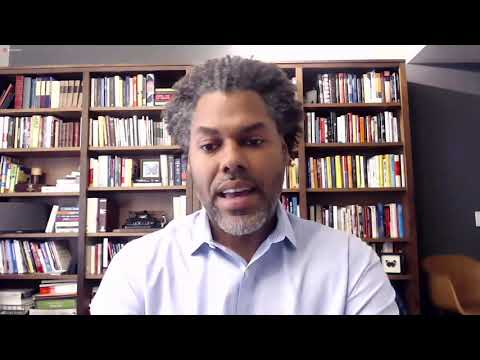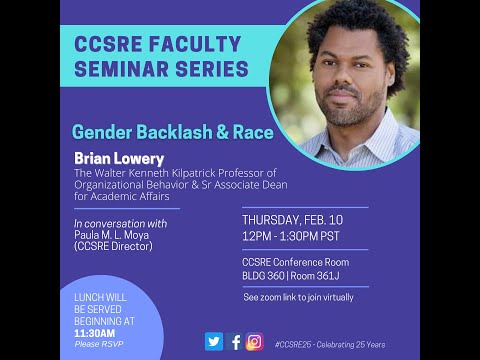Videos
Learn More About Brian Lowery
When there are many ways that seemingly trivial daily interactions with others shape us and those around us, how can leaders become more self-aware and better understand the experiences of their colleagues to create more meaningful and productive work environments?
Brian Lowery Ph.D., the Stanford Graduate School of Business Walter Kenneth Kilpatrick Professor of Organizational Behavior, has become one of the world’s top authorities on the nature of how we identify ourselves and how others identify us. A social psychologist, his work explores the nature of “self,” from how others help us create meaning in life to the ways individuals understand inequality and racial equity initiatives.
“My goal is to help leaders understand how environments dictate who we are and who we can be,” explains Lowery, co-director of Stanford’s Institute on Race. “How does our concept of who we are affect how we experience life, and how does that impact the sense of meaningfulness in our work and lives?”
Creating Meaning at Work
In his book and upcoming TED2024 talk, Lowery describes how the relationships we cultivate help create the experience of meaning. He focuses on how we can create relationships that provide others with a sense of coherence, purpose, and significance that gives them meaning. Lowery suggests that leaders who want both the best for, and most from their people think carefully about how they create the experience of meaningfulness in/at work.
Defining Who We Are Internally and Externally
Author of one of Inc.’s Best Books of 2023, “Selfless: The Social Creation of ‘You’“ (Harper, March 2023), Lowery explains that others influence us in ways we can’t see, and we subconsciously respond to the world in incredibly complex ways. In the book, he challenges readers to take a new view of the way others affect us and what we can be, and vice versa.
“We affect everyone we interact with,” explains Lowery, director of Stanford GSB’s Leadership for Society program. “We have to understand that responsibility and consider what the world would look like if we took more responsibility for the interactions we have with others.”
The Best Leaders Understand Who They Are First
When working with organizational leaders, Lowery urges managers not to try to impose their will on their teams to make them do what they want, but to look inward and prioritize their own self-development.
“Don’t worry about how to change the team,” explains Lowery, host of the Know What You See podcast. “Think about how to change yourself and how that will affect the team.” Doing so, he says, empowers leaders to work with their teams in ways that are constructive, supportive and purposeful.
Lowery expertly advises executives on many of the finer nuances of leadership, giving continuous performance feedback to employees, which empowers them to bring their everyday capabilities to their jobs; and a topic of rising importance today – creating practical strategies for responding to employee activism.
Lowery’s message is ultimately one of taking the time to understand oneself in order to understand others.
“When I work with leaders, I focus on self-awareness, perspective taking and understanding of context. It’s important not to confuse your own experience of work with the experience of your workers,” he explains. “People work harder when they can identify with the team and see themselves as connected to a common identity. You get more effort, more commitment and better coordination. These are just some of the many positives that come from nurturing a shared identity at work.”
###
Brian Lowery is the Walter Kenneth Kilpatrick Professor of Organizational Behavior at the Stanford University Graduate School of Business.
At the Stanford University Graduate School of Business Lowery created and directs Leadership for Society, a program that develops leaders’ ability to engage with challenges of the modern landscape of leadership. He is also a founding co-director of Stanford’s Institute on Race. The mission of the institute is to “produce cutting-edge knowledge and solutions to realize racial justice.”
Lowery’s research has been published in major scholarly journals such as the Journal of Personality and Social Psychology, the Journal of Experimental Social Psychology, and Law and Human Behavior. He has also been featured in popular outlets such as GQ and NPR.
Lowery also hosts a podcast, Know What You See, for which he interviews thought leaders like former Google CEO Eric Schmidt, former senator Jeff Flake, and Mitchell Silver, commissioner of NYC parks. In addition, he teaches a webinar open to the public, The Leadership for Society series, all of which can be found at KnowWhatYouSee.com.
Lowery received his doctorate in social psychology from UCLA in 2001 and has been on faculty at Stanford since 2002.
Brian Lowery is available to advise your organization via virtual and in-person consulting meetings, interactive workshops and customized keynotes through the exclusive representation of Stern Speakers & Advisors, a division of Stern Strategy Group®.
Defining Who We Are Internally and Externally
What makes us who we are, and how can understanding our identity help us find meaning in work and life? In this enlightening presentation, Stanford Graduate School of Business Professor Brian Lowery draws on his acclaimed book, “Selfless: The Social Creation of ‘You’” to explain how others influence us in ways we can’t see and how we respond to the world in incredibly complex ways that we don’t even see ourselves. Through his research-driven investigation into how others affect us and what we can become – and vice versa – audiences will gain fascinating insight into how we experience life, empowering them to interact with others in more empathetic and self-aware ways.
Openly Engage With Others to Understand Our Own Biases
How do our environments create unconscious biases and what can we do to be more aware of them? According to Stanford Graduate School of Business Professor Brian Lowery, taking the time to engage with others – whether you agree with them or not – helps us see how our individual environments shape each of us differently. By gaining an understanding of how our backgrounds shape us and how our interactions with others shape them, audiences will learn practical strategies for recognizing their own biases to better empathize with others and their unique experiences.
The Best Leaders Understand Who They Are First
How can managers better lead teams by prioritizing self-awareness first? Stanford Graduate School of Business Professor Brian Lowery says looking inward can create new avenues for effectively leading cohesive teams. In this engaging presentation, he illustrates how self-awareness, perspective taking and understanding of context empowers leaders to build teams in ways that are constructive, supportive and purposeful. Lowery provides practical strategies for reconsidering how senior managers can constructively respond to employee activism and how to create a shared identity within teams. Audiences will gain effective tools for relating better to their employees, teams and each other, unlocking exceptional levels of commitment and coordination within teams.
Cultivate Relationships to Create Meaning at Work
How can leaders better understand the experiences of their colleagues to create more meaningful and productive work environments? According to Stanford Graduate School of Business professor and social psychologist Brian Lowery, Ph.D., the relationships we cultivate help create the experience of meaning, and leaders who want both the best for, and most from their people must think carefully about how they create the experience of meaningfulness in and at work. In this engaging presentation, Lowery draws from his book, “Selfless: The Social Creation of You” and his upcoming TED2024 talk to outline how creating relationships that provide others with a sense of coherence, purpose, and significance gives them meaning. Audiences will gain accessible strategies for building productive, empowering relationships that will bolster a sense of purpose and meaning at work.
Praise for "Selfless"
“[Lowery] investigates many commonly held assumptions that selfhood is, for the most part, a privately malleable entity originating within us at birth, and that absolute liberty in defining it might be both possible and desirable. We know ourselves better and can improve our chances at self-improvement, the author explains convincingly, if we accept that our identities are fluid, socially determined phenomena…. An informed, thought-provoking consideration of the relational dimensions of our lives.”
“An unusually insightful look at how our social world shapes who we become. This book will challenge you to rethink many of your assumptions about what drives your decisions, your actions, and your identity.”
“This powerful book is guaranteed to change the way you see yourself and the world around you. Lowery masterfully weaves science and stories together to expose that we are all selfless – shaped in each moment and over years by our social situations. 'Selfless' is a gift – an engaging and important book that will help you better understand the influence of the web of relationships you inhabit.”
"Blending psychology, philosophy, and sociology, Lowery relays the exploration of what a self is into questions about how selfhood relates to personal autonomy, the consequences of our actions, and the desire for a meaningful life. Lowery is remarkably skillful at making these potentially heady themes clear and accessible, and engaging with them makes for a rewarding journey."











































